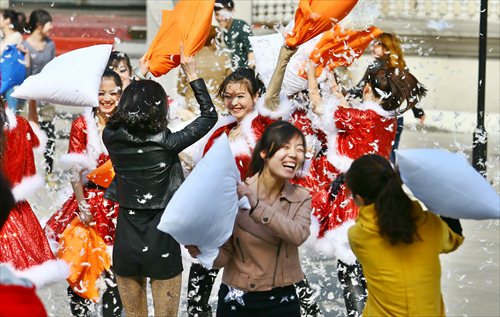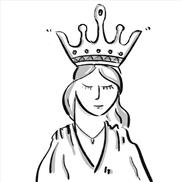METRO SHANGHAI / METRO SHANGHAI
Will male chauvinists find comrades in Shanghai?
Fighting for fairness

In a city like Shanghai famous for henpecked husbands experts believe male chauvinism still dominates. Photo: IC
Return of Kings, the controversial American anti-woman group, had planned an international day for its supporters in 43 countries on February 6. Shanghai was one of the cities listed by the group.
But the minute this was announced a barrage of media coverage and hostile criticism around the world saw the group's leader, Daryush "Roosh" Valizadeh, cancel the meetings including the one in Shanghai. He said he could not "guarantee the safety or privacy of the men who wanted to attend."
The Global Times contacted Valizadeh and other key members of Return of Kings, but none of them responded.
Searching online, it seems there are no groups like Return of Kings in China or organizations with similar anti-woman and anti-feminist aims and it also appears that Chinese male chauvinists do not meet regularly or formally either. There are several male chauvinistic forums on baidu.com, but they have not formed groups of any description.
However this does not mean that women have won the battle for respect and equality in China - feminists in Shanghai assure us that this is certainly not the case.
A pro-feminist man
Wu Kening (pseudonym) is a pro-feminist man working in Shanghai and he said he has heard of the Return of Kings group. "But I have never heard of them meeting here," he said.
Wu sees prejudice against women constantly in his daily life. "Male chauvinism and discrimination against women are everywhere in our work and lives. Chinese men don't need to have organizations or meetings to affirm their prejudices and they don't call themselves male chauvinists either, because in Chinese this is a negative and derogatory term. That would be like someone declaring that, in the end, they got away with a crime."
Anti-woman groups like Return of Kings have appeared comparatively recently in the West. On its website Return of Kings says "it aims to usher the return of the masculine man in a world where masculinity is being increasingly punished and shamed in favor of creating an androgynous and politically-correct society that allows women to assert superiority and control over men."
But China is still a male dominated society and feminists here say men in China don't have to organize chauvinistic events to consolidate their dominance. They say Chinese men are using traditional Chinese values to train women to be subservient.
Li Sipan runs Women Awakening, a feminist media platform that publishes articles on Weibo and WeChat. She believes that in China activities that train women to obey their husbands and stay subservient are quite common.
In 2014, Women Awakening investigated courses on "female virtue" in China and reported that students were attracted to these because they promised to teach traditional Chinese culture.
In the classes, women were taught to not be strong at work, and to follow traditional rules in obeying their husbands. Getting a divorce or not having children could be sins for a woman. Even if their husbands cheated on them during pregnancy or if they raped another woman, it was the wife's fault.
Well developed
"The female virtue classes are like pyramid-selling organizations. They teach anti-feminist content," Li said. "China does not need to bring in anti-feminism groups from the US, because anti-feminism in China is quite well developed. Last year, a group of Confucian scholars met in Shanghai. They were all men in their 30s and 40s. Although they were talking about Confucianism, everyone knew they were anti-feminist. Their speeches about women were similar to the outpourings of groups in the US."

Women let off steam with a pillow fight. Photo: Yang Hui/GT
Market supremacy
Li Sipan said the Chinese iPencil Economic Research Institute emphasized the supremacy of the market and opposed values like gender, racial and class equality. "But it was Confucianism that put male chauvinism into practice."
But why did Return of Kings choose Shanghai as one of its meeting sites? Was this a reference to the national caricature of a Shanghai husband as a henpecked subordinate and perhaps the feeling that Shanghai men needed support to stand up to women?
For the pro-feminist Shanghai man Wu this was certainly not the case. "On the contrary, it proved that male chauvinism is strong in Shanghai. It is a sign of disrespect. Shanghai men pretend they are chivalrous when they are with women. But their so called respect, patience, and care for women actually weaken women," Wu said.
He said a key concept of feminism was gender equality. But equality does not mean treating the other gender with extra care. Equality should mean treating the other gender the way one expected to be treated oneself.
"Shanghai men have no physical reason to fear their wives. The henpecked attitude is not about fear but about the way they are seen in society, and showing that they are responsible and care for women," Wu said. "When Shanghai men act henpecked they are just showing their masculine arrogance."
Chen Yaya is a gender equality researcher at the Shanghai Academy of Social Sciences. She believes that there are a great many male chauvinists in Shanghai. "But they don't know that they are chauvinists. They feel that they are open and equal in their gender values. Some even think they are feminists," Chen said. She said some research showed that in Shanghai homes women still did more housework than men and this was only a little better than the situation in other provinces.
Over the past century, feminists have achieved a great deal in China, promoting equality and encouraging discussions about gender discrimination. But there have also been setbacks.
Gender equality was of one of the key reforms that the Chinese Communist Party introduced after 1949 and some of the positive effects of the reforms were evident in Shanghai where employment rates were high for city women. And some who didn't work could take part in community committees.
Li said a good example was the way day-care centers were developed in Shanghai. "Shanghai husbands would share the housework. However, after the reform and opening-up in the 1980s, the percentage of female politicians fell. In the 1980s there were also serious problems with discrimination against women in the workforce."
Some non-governmental feminist groups were launched in the 1980s and 1990s and in 1995, the Fourth World Conference on Women was held in Beijing. One great change after the conference was that Chinese feminist groups began to receive donations from international bodies. The interactions between local feminist NGOs and international groups encouraged new concepts and approaches to China.
"Since 1995, most of feminist NGOs are based in Beijing with some in provincial capitals like Xi'an and Zhengzhou. There are very few in Shanghai," Li said.
Rural projects
Feminist groups have done a lot of work in the rural areas of Yunnan, Henan and Shaanxi provinces. One project encourages women to become rural village officials. Last year on December 27, China's first law against domestic violence was approved by the National People's Congress, and it will become effective on March 1, 2016.
Individuals have also been fighting against discrimination on social media. "When a celebrity publishes some prejudiced statement on social media, feminists like us no longer need to respond - other users will have criticized him or her already," Li said. She believes that social media has given women a chance to fight back and defend their rights through public opinion.
"I hope that our political and legal systems allow feminists to fight against discrimination and unfair treatment. If not, there could be a lot conflict but no way out," Li said.

